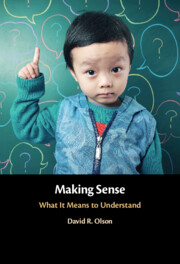Book contents
- Making Sense
- Making Sense
- Copyright page
- Dedication
- Contents
- Figures
- Tables
- Preface
- 1 An Introduction to the Puzzles of Understanding
- 2 Understanding As Feeling and As a Concept
- 3 The Linguistic Basis of Mind
- 4 Subjective Mental States
- 5 Objective Mental States
- 6 Intersubjectivity of Mental States
- 7 Identity Conditions for Feelings and Concepts
- 8 What “Understanding” Means
- 9 The Referential Scope of Understanding
- 10 Understanding and Children’s Theory of Mind
- 11 Understanding and Sense-Making
- 12 Understanding As a Learnable Skill
- 13 Understanding in Everyday Life
- 14 Ascriptivism and Cognitive Development
- References
- Index
10 - Understanding and Children’s Theory of Mind
Published online by Cambridge University Press: 21 April 2022
- Making Sense
- Making Sense
- Copyright page
- Dedication
- Contents
- Figures
- Tables
- Preface
- 1 An Introduction to the Puzzles of Understanding
- 2 Understanding As Feeling and As a Concept
- 3 The Linguistic Basis of Mind
- 4 Subjective Mental States
- 5 Objective Mental States
- 6 Intersubjectivity of Mental States
- 7 Identity Conditions for Feelings and Concepts
- 8 What “Understanding” Means
- 9 The Referential Scope of Understanding
- 10 Understanding and Children’s Theory of Mind
- 11 Understanding and Sense-Making
- 12 Understanding As a Learnable Skill
- 13 Understanding in Everyday Life
- 14 Ascriptivism and Cognitive Development
- References
- Index
Summary
A philosophical tradition going back to Descartes assumed that human beings have an indubitable consciousness of their own minds but that knowledge of other minds was at best inferred. What they failed to see was that the consciousness, the felt experience that could not be doubted, was not the same as introspection. William James, as mentioned in Chapter 4, was guilty of this conflation. Introspection is enabled by mental concepts used in ascribing mental states to others. Put simply, introspection is self-ascription; one cannot introspect without linguistic concepts of mind. As Montgomery (2005, p. 120) pointed out in regard to children’s acquisition of theory of mind, “introspective knowledge [plays a much smaller role] in mental concept formation than is sometimes claimed.” Montgomery’s concern has been ignored by those influenced by Simulation Theory.
- Type
- Chapter
- Information
- Making SenseWhat It Means to Understand, pp. 106 - 122Publisher: Cambridge University PressPrint publication year: 2022

